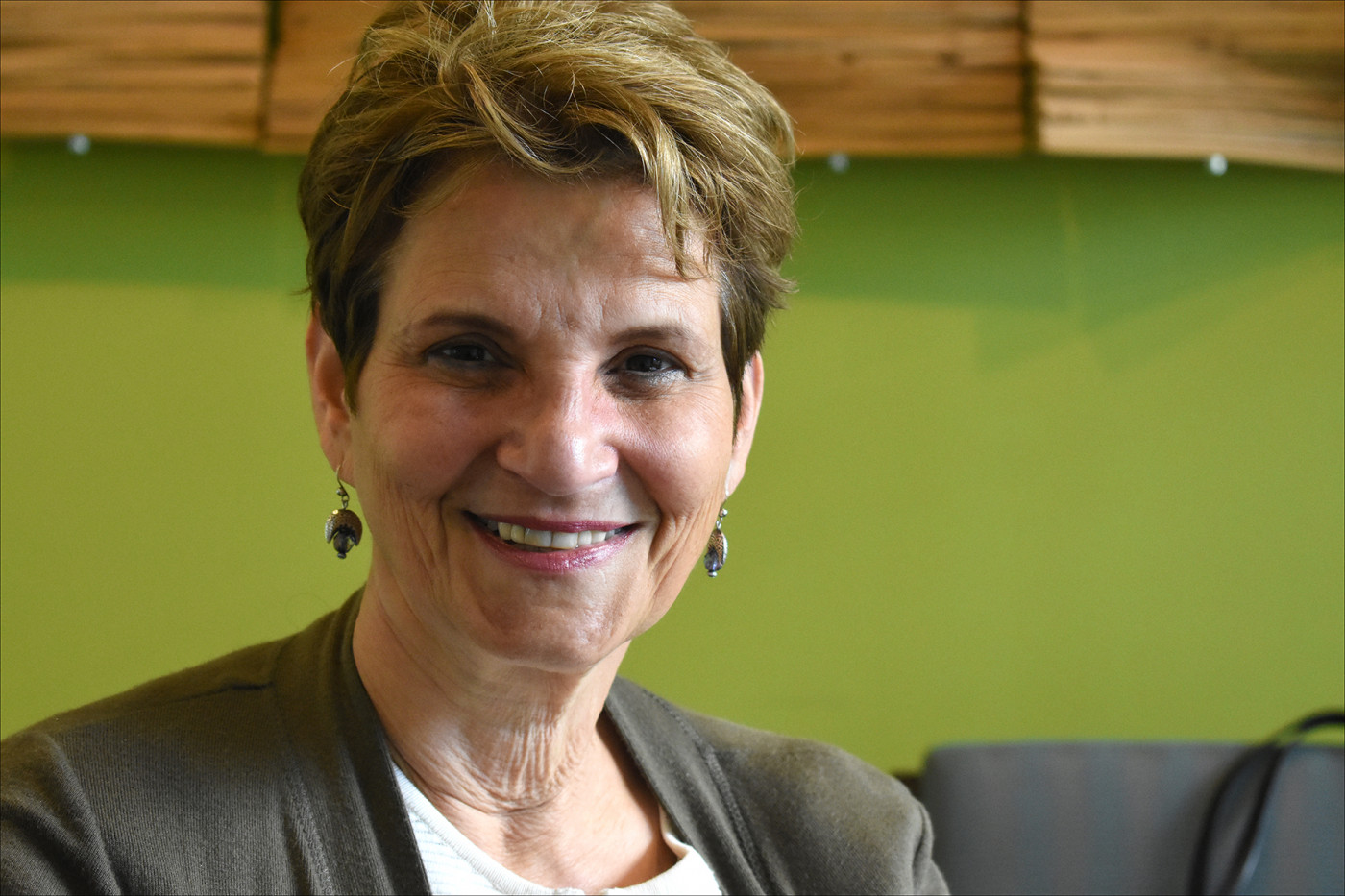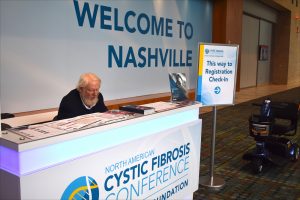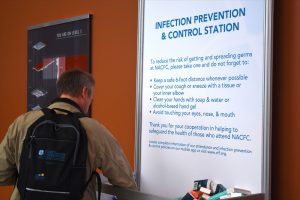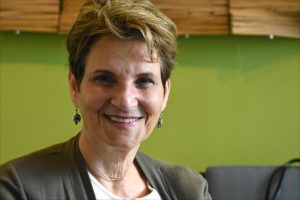CFF Programs Strive to Reduce Patients’ Isolation
Written by |

Drucy Borowitz, MD, senior VP of community partnerships at the Cystic Fibrosis Foundation.
Oregon retiree Carol Birch, 59, considers herself especially lucky to have made it this far in life.
“I’ve never felt that I fit the typical role of someone with cystic fibrosis (CF),” Birch told attendees at the 2019 North American Cystic Fibrosis Conference (NACFC) in Nashville, Tennessee.
Diagnosed at the age of 15, Birch said she soon realized she’d need a job with good health benefits to pay for her recurrent sinus polyp surgery.
“So I got a government desk job working with budgets and grants for water resource programs,” said Birch, speaking Nov. 1 to NACFC delegates by video link from northwestern Oregon. “Working full-time was really hard and I had a long commute. I did that for over 30 years, and was able to retire with benefits six years ago.”
Shortly before her retirement, Birch began caring for her aging mother.
“I never dreamed I’d live long enough to become a full-time caregiver,” she said. “I was really glad that I was able to take care of her, just like she took care of me. But arthritis was setting in, and my hips started bothering me. I didn’t have the strength I had when I was younger; I felt my body changing and realized I needed to take better care of myself.”
After her mother died nearly two years ago, Birch moved from Tucson, Arizona, to Oregon, where she could be close to the Portland CF Care Center. She also discovered CF Peer Connect — a program run by the Cystic Fibrosis Foundation (CFF) — and requested a mentor so she could talk to other patients her age and in the same situation.
Median life expectancy now 46
Aimee Jeffrey, senior manager of community support at CFF, said the program is especially important now that advances in CF treatment have pushed life expectancy for those with the disease to a median age of 46.
Since the program began more than three years ago, 582 people have participated, and 411 matches have been made; three-fourths are female, and the median age is 28. In addition, 228 mentors have been trained — two-thirds of them women — with a median age of 37, though their ages range from 19 to 80.
Among CF patients who requested matches was a 48-year-old married woman with no children.
“She had never met anyone with CF her age or older, and felt as if she had outlived everyone,” said Jeffrey, who also spoke at NACFC. “We connected her with a 59-year-old woman with CF who’s married and also has no children.”
Another request came from a 60-year-old married man with CF whose kids were grown. He had been diagnosed in his 30s, and was now dealing with sinus issues and CF-related diabetes. CFF matched him with a 58-year-old man coping with similar symptoms.
A 64-year-old man with CF, married with two adult children, was a mentor in the program on topics such as aging and employment. But when facing the possibility of a lung transplant, he requested a mentor himself — and was paired with a 65-year-old man who had had a lung transplant in 1995.
Matches are based on gender, age, topics, and other factors. Contact is made via phone, email or video. Conversations are informal and unstructured, and generally last three months.
Among the most requested topics are employment decisions, relationships, parenting, and starting a family. Less frequent topics include hospitalization, bereavement, LGBTQ issues, aging with CF, living with a G-tube, and post-transplant adjustment.
‘Somebody who gets it’
CF Peer Connect is one of several programs supervised by Drucy Borowitz, MD, CFF’s senior vice-president of community partnerships. Her job is twofold: to bring patients’ perspectives and experiences to help shape CFF programs and activities, and to find new ways to connect CF patients with each other.
“There’s the issue of safety because of infections, but also the United States covers a huge geographic area and people have to travel long distances,” Borowitz told Cystic Fibrosis News Today between sessions at NACFC 2019. “This is why we have created these virtual events, to encourage a sense of connection and belonging.”
Another program, Teen Connections, caters to two groups of teenagers: CF patients from ages 13 to 15, and patients 16 to 18. These sessions are moderated by an adult with CF, as well as a CFF staff member.
“This sense of connection is incredibly powerful. People want to connect with each other,” she said. “We hear over and over, ‘it’s so good to talk to somebody who gets it.’ We also frequently hear people saying they’ve never met someone else with CF.”
Borowitz, a pulmonologist, attended Cornell Medical School, interned at Children’s Hospital of Philadelphia, and did her residency at University of California-San Francisco. For many years before joining the CFF, Borowitz headed an adult cystic fibrosis care center in Buffalo, New York, covering an eight-county area.
“It was during that time that it became clear there were going to be more and more adults with CF, and that we needed adult CF care centers,” she said. “This was a disruptive idea because CF had always been a pediatric disease.”
The foundation’s signature online gathering is BreatheCon, a two-day annual event that last took place Sept. 20–21; the next one is scheduled for Sept. 25–26, 2020. Such virtual events include plenary sessions in which everyone participates, as well as separate, breakout sessions on specific topics.
“We also do some fun things, like yoga, cooking, and painting classes, and a comedy show, as you would at a real conference, and people are able to do it from the comfort and safety of their homes,” she said.
Prioritizing mental health
To date, more than 3,000 people have attended online events. The most recent was CF MiniCon: Transplant, a three-hour event held Nov. 14 for those who are considering lung transplants, as well as those who have already undergone the procedure.
“We try to meet the needs of people who are in very different places in their CF journey,” she said. “For example, people with advanced lung diseases have very specific things they want to talk about. The unique feature of all these events is that the agenda and content are set by community members. We, the foundation, do not create the agenda; we facilitate it by giving the technology platform.”
Community Voice is another program that now includes 1,100 people from all 50 states who have been touched by CF; half are adults with CF, and half are parents of children with the disease. Its goal is to offer opportunities for CF patients and family members to actively shape research and programs that affect the CF community.
A more specialized group, Research Voice, has more than 130 participants who receive special training in drug development.
Lately, Borowitz said, the CFF has allocated more resources to mental health — an increasingly common issue as CF patients live longer lives.
“Finding a cure for CF was the focus of the foundation for most of its existence. That’s what has brought us to this moment,” Borowitz said. “But in recent years, we’ve been able to expand the things we can do to help people with CF. It’s no longer a case of survival, but of having a full life. That’s where the focus on mental health comes in.”
Besides providing conferences and peer support, CFF also awards “impact grants” to members of the CF community with program ideas to help their peers. Most are related to exercise, though the foundation also offers online arts programs and singing lessons.
“My goal, ever since I understood what CF was, has always been to make it to 100,” said 56-year-old Barry, a CF patient. “Now that I’m halfway here, I see that goal is a lot more difficult than I thought it was going to be. But I’m still determined to make it there.”
Another CF patient, Lindy, 40, added: “Living with CF is really hard, but we have other people to help us through it. People with CF need each other. We need to know that we’re not alone.”










